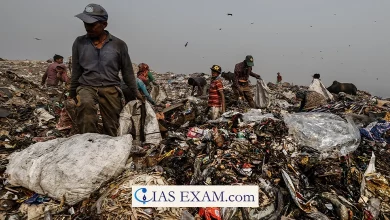Daily Current Affairs for UPSC
Amendments released on Food Safety and Standards (Labelling & Display) Regulations
Topic- Statutory Bodies [GS Paper-3]
Context- The Food Safety and Standards Authority of India has released a draft notification on front-of-package labelling, which proposes Indian Nutrition Rating (INR) modelled on the health star-rating system.
Key Highlights
- The draft containing the amendments on Food Safety and Standards (Labelling & Display) Regulations, 2020 was released by the FSSAI recently.
- It requires packaged food to display the prescribed format of INR by assigning a rating from 1/2 star to five stars that means least healthy to healthiest.
- The INR is calculated with respect to the contribution of energy, saturated fat, total sugar, sodium and the positive nutrients per 100 gm of solid food or 100 ml of liquid food.
- According to the draft notification, the stars assigned to a product will be displayed close in proximity to the name or brand name of the product on the front of the pack.
- Certain food products such as milk and milk-based products, egg-based desserts, infant formula, salads, sandwich spreads and alcoholic beverages etc have been exempted from INR.
- However public health experts are opposed to the health-star rating system as according to them it gives a health halo because of its positive implication making it harder to identify harmful products.
- Stakeholders have been given 60 days to submit their responses to the draft notification.
Food Safety and Standards Authority of India (FSSAI)
- Food Safety and Standards Authority of India (FSSAI) is an autonomous statutory body established under the Food Safety and Standards Act, 2006 (FSS Act).
- The Ministry of Health & Family Welfare, Government of India is the nodal Ministry of FSSAI.
- Its headquarter is situated in Delhi.
Structure
- The FSSAI comprises a Chairperson and twenty two other members out of which one third are to be women.
- The Chairperson of FSSAI is appointed by the Government of India.
- It is assisted by Scientific Committees and Panels to lay down standards and the Central Advisory Committee in coordinating with enforcement agencies.
Key Processes followed by FSSAI
- To set standards of food products
- To promote safe food practices
- To issue license to food businesses
- To ensure compliance through inspections
- To test food for standards
- Training and capacity building
- To promote Citizens Outreach
Functions of FSSAI
- It frames regulations to lay down the standards and guidelines of food safety.
- It issues FSSAI food safety license and certification for food businesses.
- It makes procedures and guidelines for laboratories in food businesses.
- It suggests the government for framing food related policies and programmes.
- The FSSAI also collects data regarding contaminants in foods products, identification of emerging risks and introduction of a rapid alert system.
- It is responsible for creating information networks across the country about food safety.
- It promotes general awareness about food safety and food standards.
Challenges Faced by FSSAI
- The trifling manufacturers, retailers and hawkers are exempted from FSSAI confines.
- Whereas these segments greatly contribute to the unorganised food sector and due to its low prices, most of the population prefer food consumption from these segments.
- Insufficient infrastructure such as food testing laboratories is one of the major drawbacks faced by FSSAI. There are only about 87 National Accreditation Board for testing and calibration Laboratories (NABL) accredited Labs, whereas there are more than 1500 private labs in India.
- Shortage of qualified manpower and functional food testing equipment in state food laboratories and referral laboratories give rise to insufficient testing of food samples.
- There is an acute shortage of licensing and enforcement officers in the states which results in growth of unauthorised food businesses which severely affects food safety measures.
- FSSAI has been only prescriptive in nature and failed to ensure safety, quality and hygiene in the food industry.
- There are only 377 products mentioned in the FSSAI regulations whereas other countries have over 10,000 standards and also the list is not regularly reviewed.
- FSSAI suffers highly due to lack of funding for monitoring the widening ambit of food laws.
- Also, there are no sufficient practices for food inspection, the process being mostly discretionary.
- Cumbersome and lengthy approval procedures delay the pre-launch approvals for products from the FSSAI.
- Delivery of imported food products often remain stuck at the ports awaiting clearance by the FSSAI, sometimes due to small problems like labelling of the packages not conforming to arbitrary norms specified by the FSSAI, which differ from the widely accepted global standards.
- Differences of opinion between the food regulator and the food processing ministry also delay the FSSAI functioning.





.png)



